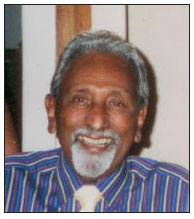Services on Demand
Article
Indicators
Related links
-
 Cited by Google
Cited by Google -
 Similars in Google
Similars in Google
Share
SAMJ: South African Medical Journal
On-line version ISSN 2078-5135
Print version ISSN 0256-9574
SAMJ, S. Afr. med. j. vol.100 n.4 Pretoria Apr. 2010
FORUM
IN MEMORIAM
Ralph Lawrence (1920 - 2009)

Professor Ralph Lawrence, born in Durban in 1920, died on 17 December 2009 after a long career in forensic medicine. As one of the first black doctors to graduate from the University of Cape Town, he worked actively to end racism in medicine, even after he left South Africa in 1948 to pursue postgraduate studies, driven overseas by the racism of the new apartheid government.
Ralph Lawrence recounted in 2008 that he knew from a young age that medicine was his career of choice. 'At the age of 10 or 11 when people in the playground hurt themselves they would come to me for help.'
After matriculating in 1938, he applied to study medicine in the UK, but was told to apply the following year. Alas, that year war broke out and these plans were again postponed. In the interim, he worked as a bricklayer's assistant and in an advertising agency before being accepted to study medicine at UCT.
Travelling to Cape Town from Durban by train for a person classified as Indian was not easy. He was excluded from the university's residences because they were reserved for 'white' students, and had to stay in a District Six hotel where 'conditions were basic and the food was poor'. When he complained, he was asked to leave the hotel and found accommodation with an Indian family.
Once Ralph started his medical studies, he was not sure if he would be allowed to complete them at UCT. In those days, black students were enrolled for pre-clinical studies and were then required to complete the clinical years at universities overseas. However, with the war raging, there was no possibility of overseas travel. Along with others, he petitioned the authorities to allow black students to complete their medical studies at UCT. The university bowed to the pressure and allowed them to register for the clinical years on condition that they not enter 'European' wards or be present at any examination or clinic where white patients were seen.
On 13 May 1944 Ralph was suspended from classes pending a disciplinary hearing for being present at clinics where white patients were present, in 'violation' of the condition of his registration. He was acquitted on a technicality as he had not been formally notified of the race-based conditions of his registration.
In September 1944 he was elected to the Students' Representative Council (SRC) of UCT. He was the first person of colour to serve on this council. Attempts were made to remove him from the SRC and he suffered the indignity of having SRC members walk out of the annual dinner because of his presence. He was also barred from the official SRC photograph in case the vice-chancellor, Jan Smuts, was offended by the presence of a black student. In a speech made at the end of his term of office on the SRC, Ralph called on students to make a firm stand for democracy and to fight for a better South Africa.
Ralph obtained his MB ChB in 1945, one of three who were the first black students to graduate as doctors from UCT. In September 1948 he left South Africa to further his studies in the UK. In 1950 he married Bronwen Arthur and they had three sons. He served as the principal forensic physician to the Derbyshire Constabulary from 1953 to 1998. As a member of the British Panel of Expert Witnesses he continued to conduct forensic examinations well into his 80s, remaining intellectually active virtually until his death.
His career in medical politics in the UK included representing the Derby region for 23 years at British Medical Association (BMA) annual meetings, chairing several BMA committees and serving 14 years as a member of the BMA Council. His pioneering work in general practice, forensic medicine and medical politics started at the birth of the UK National Health Service. His 2006 autobiography, A Fire in His Hand (Athena Press), contained sharp insights to the history of social medicine in the UK.
In May 2002 Ralph returned to witness the signing of a faculty charter at UCT highlighting non-discrimination and equality as part of the Health Science Faculty's commitment to reconciliation, and was appointed visiting professor to the Faculty in 2003. He had an extraordinary career and will be remembered by many in South Africa for his pioneering role in highlighting the unacceptability of racial discrimination in medicine and his life's contribution to rectifying injustice. We may never see his like again.
Gonda Perez
Leslie London
Hugh Lawrence














